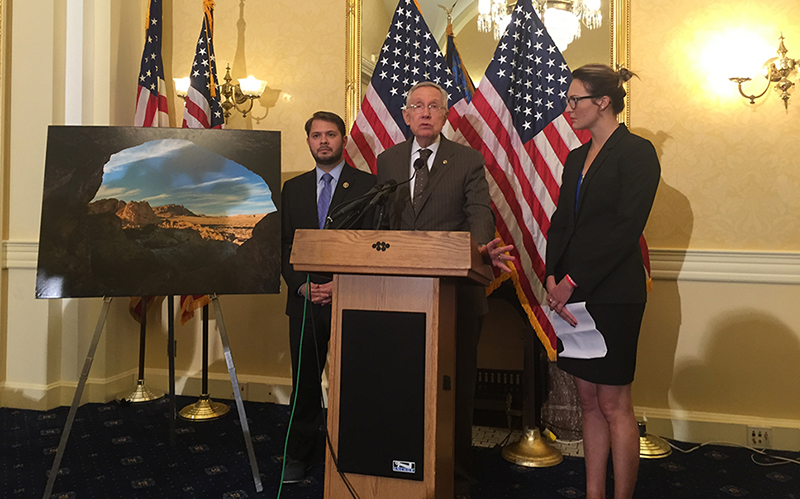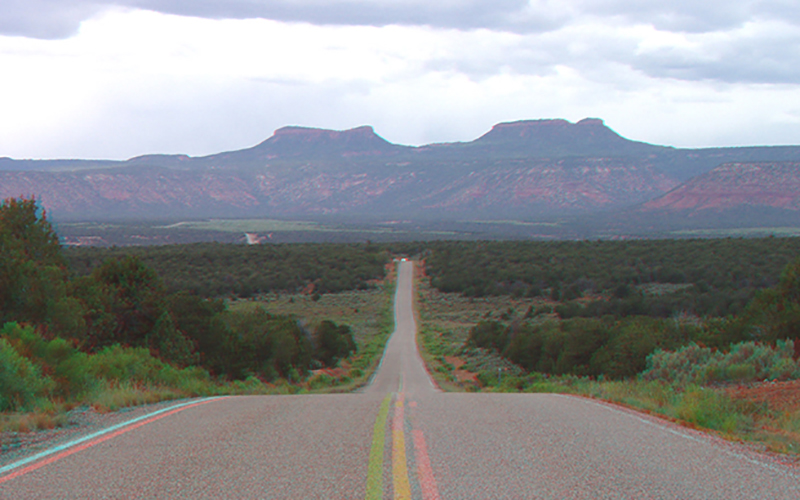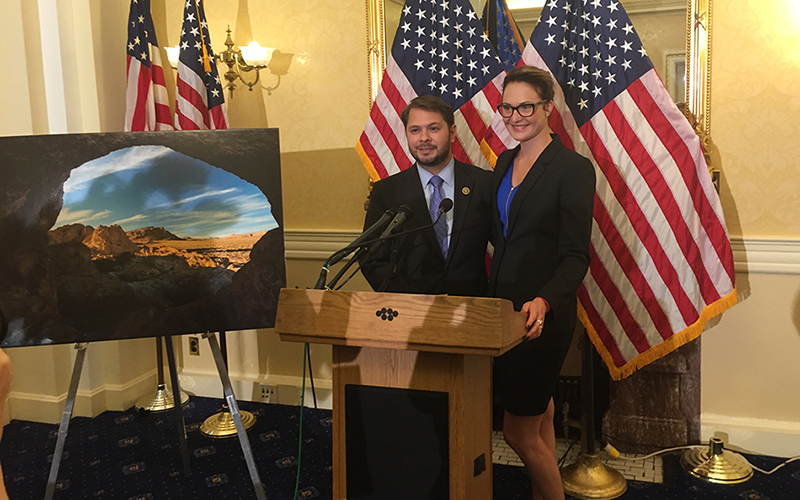
Rep. Ruben Gallego, left, and Sen. Harry Reid joined Olympic pentathlete Margaux Isaksen to make a pitch for protection of federally supervised public lands. (Photo by Adam DeRose/Cronkite News)

The two buttes of the Bears Ears, near the Natural Bridges National Monument in southeastern Utah. A push to make 1.9 million nearby acres a national monument sparked pushback in Congress. (Photo courtesy the U.S. Geological Survey

Rep. Ruben Gallego, D-Phoenix, and Olympic pentathlete Margaux Isaksen said public outdoors are important – for Isaksen’s athletic development and to Gallego as a Marine veteran. (Photo by Adam DeRose/Cronkite News)
WASHINGTON – Western lawmakers joined Olympic pentathlete Margaux Isaksen Thursday to warn against attempts to move federal lands into state or private hands and to call on the president to use his authority to expand national monuments.
Isaksen joined Rep. Ruben Gallego, D-Phoenix, and Senate Minority Leader Harry Reid of Nevada after writing a letter to a Colorado newspaper recently in which she lauded public lands for shaping her into the three-time Olympic athlete she is today.
“It’s part of America’s heritage. It’s something that’s not only important for our generations, but important for generations to come,” she said.
But Gallego said that heritage could be threatened by Republican-backed legislation.
“One of the biggest risks we’ve seen is the efforts by … Republicans to use different types of legislation to either strip away some of these protections or to stop any future protections,” Gallego said, referring specifically to proposals backed by Rep. Rob Bishop, R-Utah.
Bishop, the chairman of the House Natural Resources Committee, introduced a bill to settle an ongoing land dispute in the Bears Ears region. The Utah Public Lands Initiative designates parts of the lands in eastern Utah for conservation purposes, others for recreational purposes and parts for development under “the belief that conservation and economic development can coexist,” according to a release about the bill.
See related story:
Tribes, Grijalva push bill to create Gila River national monument
The bill was introduced in July, but has yet to get a hearing.
“We’ve seen this land seizure movement that originated in Utah essentially stall in most of the Western states,” said Aaron Weiss with the Center for Western Priorities, which supports keeping public lands in federal hands.
Weiss cited a 2016 Colorado College poll in which only 33 percent of those surveyed in Western states supported proposals to shift management of public lands from the federal government to states. Fifty-eight percent of respondents opposed such efforts.
The opposition to such transfers was even stiffer in Arizona, where 29 percent of respondents supported state control of national public lands, while 65 percent surveyed opposed the idea, according to the poll.
Groups such as the American Lands Council say it’s not a matter of taking lands away from the public, but of putting those lands under the control of states which can better manage them based on local interests.
“The federal government routinely sells off our public lands to the highest bidder, and there is nothing the states can do about it,” said the council’s CEO Jennifer Fielder.
“Public lands are awesome, we just want them managed a lot better than what we are seeing from the distant, dysfunctional Washington, D.C., bureaucracy that presently controls over half of all land in western America,” said Fielder.
-Cronkite News video by Dillion Eddie
She criticized Reid as hypocritical, claiming the Obama administration sold $85 million worth of public lands in Nevada this spring alone.
Reid on Thursday praised public lands in Nevada, specifically the Gold Butte site that he said President Barack Obama should designate as a national monument, using his authority under the Antiquities Act.
Gallego said he supports efforts to name a 1.7 million acre site around the Grand Canyon as a national monument to protect its cultural and ecological importance.
“At a minimum we really need to look at the Grand Canyon National Monument designation,” Gallego said. “We all understand the Grand Canyon is our national park, but it’s also what feeds into it that is really important.”
Gallego said public land is important to veterans like him so they can “take a timeout from the world” after returning from combat. That is especially true in a state like Arizona, which is home to the largest Ponderosa pine forest in the world and dramatic desert landscapes, in addition to the Grand Canyon.
“We certainly have a lot of work to do to protect our nation’s treasure, and we’ll have to keep doing it, unfortunately,” Gallego said.
Weiss said he is optimistic that the tide is moving away from efforts to remove stewardship of public lands from the federal government.
“We’re not declaring victory, but we’re confident that reasonable politicians from both parties realize this is not a winning issue,” he said.